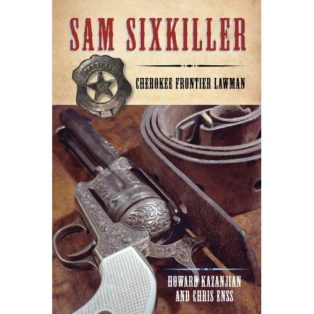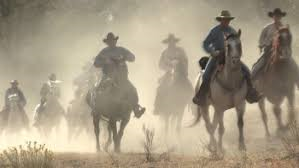Enter to win a copy of
Sam Sixkiller: Frontier Cherokee Lawman

A hot sun beat down on the busy residents of Muskogee, Oklahoma Territory, in June 1880. A heavy veil of humidity, like a stifling blanket, hung over the town as well. Situated nearly thirty miles southwest of Tahlequah, the primitive railroad stop was slowly coming into its own. More than five hundred people called the area home, and many among them were employees of the Missouri Pacific Railroad. At the end of the day, workers gathered by the score and milled about the hamlet of lean-tos, tents, and cabins. Gamblers had pitched their canvas dwellings in prime spots, and crowds flocked around their tables.
Quarrels frequently flared up between slick poker dealers and inexperienced card players. Soiled doves (prostitutes) prowled around the gaming tents and curious male bystanders like panthers. They enticed men to their crude rooms, then stripped them of any funds they had not already lost in a crooked card game. Unsuspecting shoppers and their families roamed in and out of the heated arguments that spilled into the street, gawking warily at the chaos while on their way to and from various stores.
City officials watched the scene play out in disgust. Bootleg alcohol was usually sold to the railroad crews and the houses of ill repute, and the clientele had a hard time controlling the amount they consumed. More often than not, customers who frequented bawdy houses and who drank to excess were prone to violence. They terrorized the neighborhood surrounding the brothels, recklessly firing their guns at women and children and brawling with townsmen who challenged them to put away their weapons.
In spite of repeat warnings from law enforcement officers like Colonel J. Q. Tuffts, a US agent for the Union Indian Agency in Muskogee, the madams who ran the brothels refused to voluntarily shut down their businesses. Brothels were considered a necessary evil; after all, a portion of the income spent at these houses supported public services such as the police department. Nevertheless, Agent Tuffts considered the bordellos a plague on the town, nothing more than a refuge for criminals and delinquents from miles around. When Agent Tuffts made Sheriff Sixkiller captain of the Indian Police in early February 1880, he made ridding Muskogee of such houses a priority for Sam’s administration.

To learn more about Sam Sixkiller read:
Sam Sixkiller: Frontier Cherokee Lawman.

